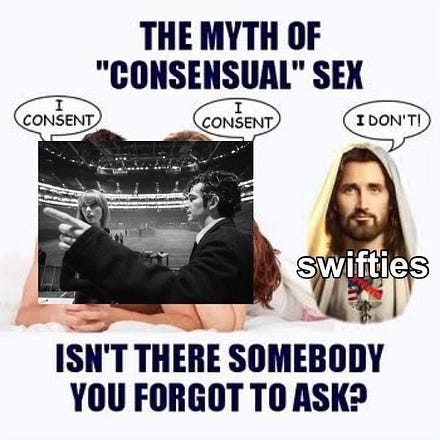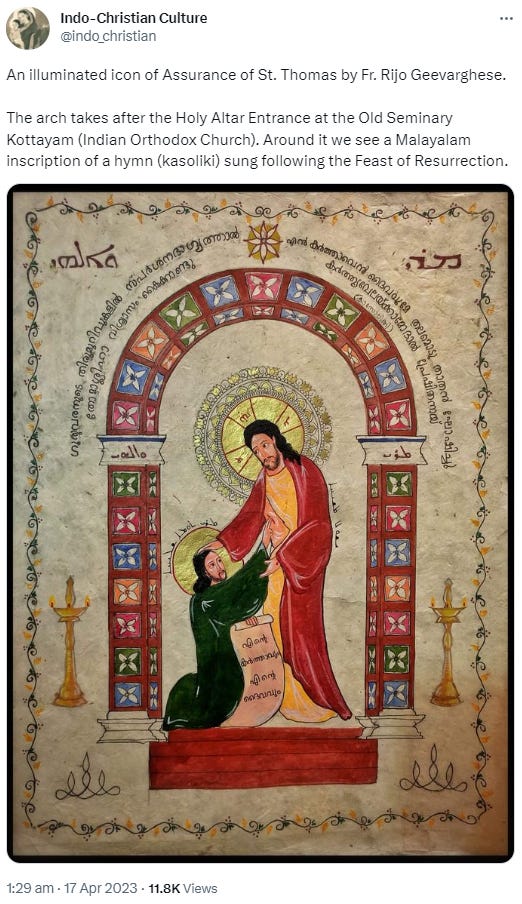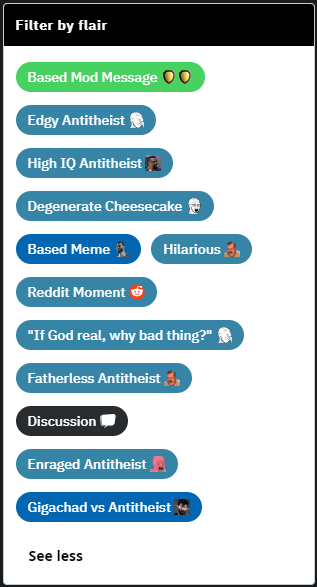The American-ness of Christian memes
A guest post by Shanti Mathias
Hello and welcome to the first of a handful of guest posts here at Modern Relics. I’ll be away all of June, getting married etc etc, but some talented readers have offered to chip in content to keep things running. If you’d like to contribute something (even something small), it’s not too late! Send me an email with a pitch and I’ll see what I can do.
This post is by Shanti, who is a staff writer at The Spinoff in Aotearoa/New Zealand. While Twitter still exists, she tweets at @VirtuallyShanti. Huge, huge thanks to her for writing this edition. I hope you enjoy it as much as I did! — Rohan
Experiencing online Christianity while not American
I have an unfortunate confession: while I am a loyal Modern Relics reader, I have only seen one episode of VeggieTales, probably a decade and a half ago — the episode about Jericho. However, I know a lot more about the animated series than this lack of experience with the source material might indicate. I know that there is a song about a hairbrush, sung by the presumably hairless cucumber, Larry. I know that the vegetables sort of bounce to move, that they all have twee American accents, and that there was a modern revamp of some kind that true fans decry as not Christian enough (or Christian at all?)
And thanks to Rohan’s hard work, I know that there is something funky going on with the Veggie Tales Twitter. How did I learn all this? Almost entirely through memes.
There’s a lot of other things about religion — specifically American-flavoured evangelical religion — which I find funny despite not having direct experience of it. I grew up in India with a New Zealand passport and bog-standard biracial displacement anxieties, going to an American school. By the time I was 14 I had a laptop, a Facebook account and a YouTube tab that was almost always open. And I discovered Christian humour.

Meme accounts called “My Jesus Jam” and “Memes for Jesus” filled my feed; on YouTube I watched the (subsequently cancelled) John Crist1 and Blimey Cow sketches. I felt vaguely compelled by this content, since it was about Christianity, and didn’t I think I was Christian? Didn’t I go to church? Never mind that my church was either a service that was half in Hindi, or a group of families sitting on the floor of different people’s houses, listening to recorded sermons.

These memes taught me a lot about what Christianity was, or at least what American Christianity was. Youth pastors, for instance, had a “get hip with the kids” type energy. Kissing for the first time AT YOUR WEDDING was a pretty normal thing to do, but awkward for other people to watch. Gender norms were strictly enforced: even today, the most popular Blimey Cow videos have titles like “10 things you should NEVER say to a guy” and “Seven ways to make a girls’ day”. I thought I might learn something from this content; I thought it was about a world I might some day live in. But so far, that hasn’t been the case.

“Evangelical Christians have actively put a lot of time, strategy and money into actively creating a culture that is not secular, that is an alternative — Christian books, Christian movies, Christian rock bands,” says Michael Toy, a PhD student and bona fide American, studying digital religious cultures at Victoria University of Wellington. “They’re really good at finding fun and light-hearted things — things that will stick.”
It’s possible to understand the tide of American Christian memes I’ve been swimming in for the last decade as a logical continuation of the Left Behind books that freaked out my mum as a kid.
There’s something alienating about absorbing so many touchstones of a culture you don’t participate in. My exposure to American Christian content, especially through memes, gave me a sense that Presbytarian USA is where Christianity happens — even if the majority of the world’s Christians are Black, brown, and/or Catholic.
“Memes showcase the negotiation of what Christianity is,” says Toy, an Episcopalian whose preference leans more to memes about the liturgical calendar.
My absorption of memes like this continued for years, until I was living in a flat with a man who had utterly different politics and theology to me, and once made me cry by suggesting that women didn’t deserve to speak in church. Still, we would tag each other in memes on Facebook — they offered a shared language, even if I wasn’t quite sure why I was laughing.
Toy connects memes to the oral cultures that preceded the written versions of the Bible: fragments and frameworks, shared between people, given a new meaning in the offering and receiving.
“These bits of the Bible are pulled out and regurgitated in different ways,” Toy says. Humour is also key. The compulsion and familiarity of Christianity makes it easy to use as a meme, because it refers to something that many people know.”

Evidence of this, perhaps: there are over 400 entries to Know Your Meme with the keyword “Jesus”. Completely non-religious Swifties, for example, can use Christian meme formats and be widely understood. The flexibility of a meme — the way that the “Myth of Consensual Sex” format, for example, is used to promote completely different ideas, often entirely unrelated to Jesus or premarital sex — offers a form of power to people whose voices aren’t always listened to in the power structures of the church.
“Meme culture can show how ideologies may or may not work for those at the margins,” says Toy.

Memes can satirise the world as much as they can teach about it; they can offer new interpretations of old ideas. There’s a democracy to memes, because they so often spread anonymously. They rely both on a shared in-group culture while also teaching the tenets of that culture to people who aren’t fully within it — like 17-year-old Shanti, living in India and spending far too much time on the internet, devout and cynical both at once. The comedy of memes, the ability to laugh at something I wasn’t really part of, connected me to an idea of an in-group, rather than the reality of one.
But while a lot of things in these memes weren’t really about me, which it took me a while to pick up on, some things are universal. The PowerPoint gag in this decade-old Blimey Cow sketch about the sameness of Christian contemporary music still hits today.
Like this post? Remember you can share it.
Let’s make Christian memes (slightly) less American
I am not a meme-maker but I wanted to rectify the American-ness of some of the above with two things.
First, there’s a wonderful Twitter account called Indo-Christian Culture which has lots of cool images of the history of Christianity in India. I love this because it gives me a sense of how my Indian Christian ancestors might have been grounded in their place and time which I feel very separate from, because the parts of India where I’ve lived had less Christian history, and what was there was quite ugly ☹.

(Yes I am losing it over this astonishing Malayalam icon! Indians looooove St. Thomas — the Doubter — because he apparently came to India after Jesus returned to heaven.)
The second is me stepping out from my “I don’t make memes, I simply enjoy them” for this very basic contribution, dedicated to anyone who has ever been at church when Sadhu Sundar Singh’s masterpiece (?!) “I have decided to follow Jesus” has appeared on the projector with a “x10” after the chorus. It’s good to do this from time to time to remember that good posting is an artform and not necessarily one I have mastered.

Amar Chitra Katha
When I did a religion class in 9th grade, my teacher was super into Amar Chitra Katha, a series of Indian comics mostly focused on Indian history and religion, including lots of Hindu mythology.
I’m not quite sure how they fit into the wider picture Hindu nationalism in contemporary India, but they’ve produced issues about Muslims and Christians (including Jesus!)

They’re still widely distributed today — I like this image of (syncretic) Indian mystic Kabir walking across water and would love to read the whole book! Will defo keep an eye out when I’m in India next. Is this the Indian equivalent of Chick Tracts? (I don’t know enough about Chick Tracts to say for sure)
Reddit’s Christian meme war
I’ve been diving into Reddit a bit lately, mostly so I can understand things that my boyfriend says. It made me wonder what Christian meme culture is like there.
I found a few interesting things: r/ChristianMemes and r/DankChristianMemes seem to have some sort of enmity and also Dank Christian Memes is more explicitly queer-affirming.

I would simply love to have the time to go through a lot of posting history to understand this. Was there a schism?
I also found “Antitheist Cheesecake” a seemingly pan-religious subreddit dedicated to dunking on athiest ideas. This subreddit is very pink (literally) and is focused on being “based” (a classic Reddit preoccupation) but at least someone finally said the quiet part out loud about those wretched Twitter “God” accounts. None of the memes were that noteworthy tbh but perhaps I haven’t loitered enough — or am too jaded from the American-ness of it all.
What makes these communities interesting to me is the rules, which gives you a sense of the flavour of the community and how it might be moderated. r/Christianmemes bans anything that is anti-Catholic, anti-Protestant, anti-LGBTQ, anti-atheist, or is jokes about Catholic priests abusing children.
I can see how this sort of creates a filter, removing some of the most low-lift, barely funny memes about religion that appear on other parts of the internet, both in religious and non-religious circles, although banning “politics” (obviously national/party politics) is interesting to me when religion is a profoundly political force. It also gives you a sense of what people on the sub might have fought about in the past.

I thought the flairs beneath posts on the Antitheist Cheesecake forum were pretty funny, indicating that the sub has some history and shared language: “Gigachad vs. Antitheist” and a user flair of “One of those Christians Satan warned you about”. I’d love to hear from anyone else who has dived into any discussion of religion on Reddit and what you found there.
This post was written while listening to Oceans (Where Feet May Fail) to get me in the mindset of being a teenager finding Christian memes on my brand-new Facebook account. It is also the only song I have ever participated in for worship leading, in my one-week tenure in a church youth band. There need to be more memes about people who left youth band due to musical mediocrity! For more (mostly better, but the bridge of Oceans still goes hard) check out the Modern Relics playlist! (Hard to believe Oceans wasn’t on the playlist already… I’ve added it — Rohan)
There is literally so much more to say about John Crist but I’m trying not to digress. ↩

